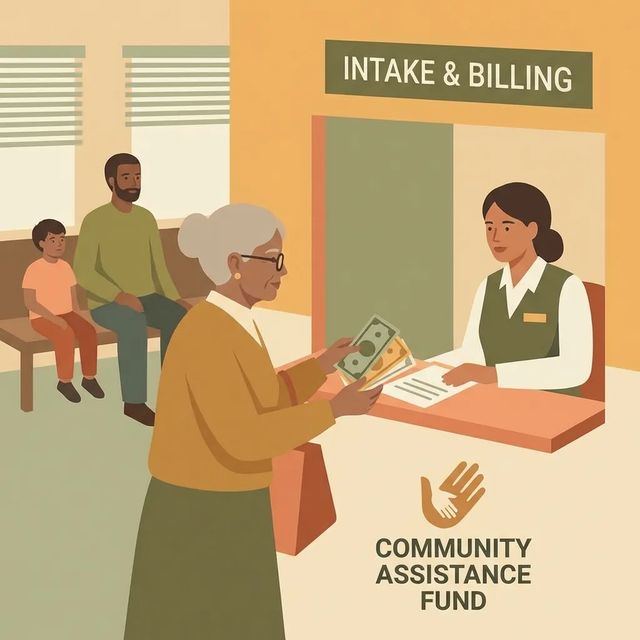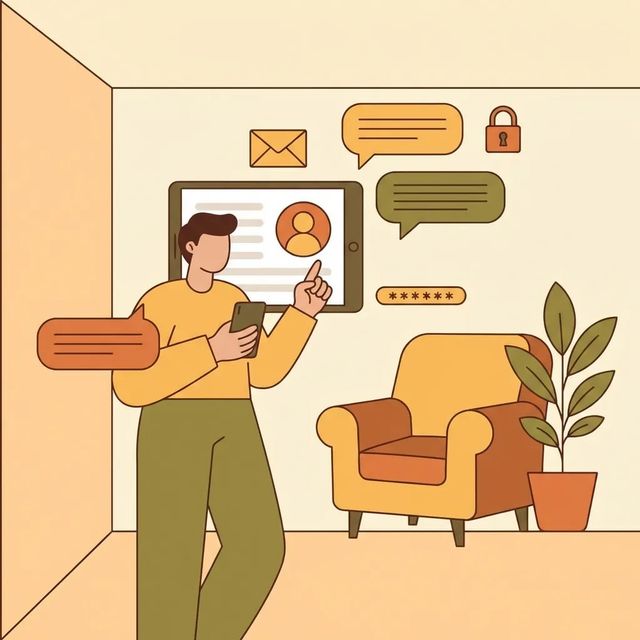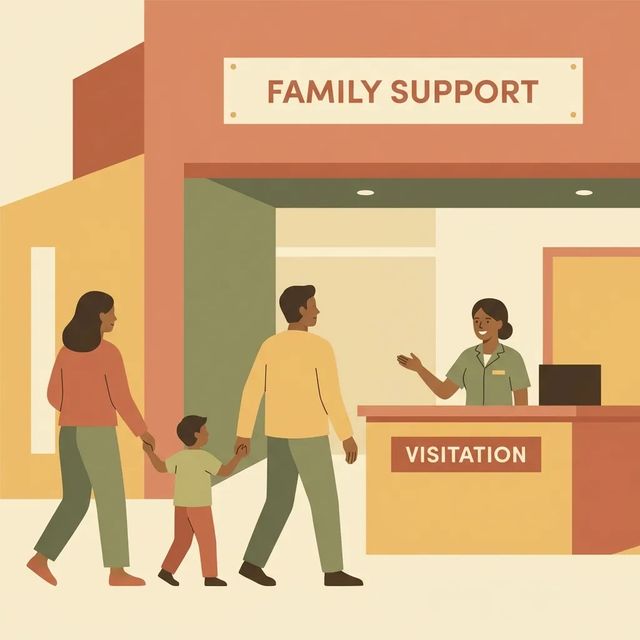Travis County Corrections Complex, TX
Need to reach someone at Travis County Corrections Complex? Look up an inmate, send messages or mail, add commissary funds, or schedule a visit.
Explore
Find an Inmate at Travis County Corrections Complex, TX
Search for a loved one and send messages and photos in minutes.

Guides for This Facility

How to Send Money to Someone at Travis County Jail: In-Person, Mail, and Western Union
Want to add money to someone's Inmate Trust Fund at the Travis County Correctional Complex? The process is simple once you have the right information. Here's exactly what you need for in-person, mail, and Western Union deposits.
Read Guide
Setting Up Phone Calls and Tablet Messaging at Travis County Jail (ViaPath & GettingOut)
Setting up phone calls and tablet messaging at Travis County Jail comes down to picking the right payment option and knowing which vendor handles what. Here's what you need to know about ViaPath's two calling options, GettingOut tablets, and Video Relay Service (VRS).
Read Guide
What to Expect & a Checklist for Onsite Visits at Travis County Correctional Complex (TCCC)
Onsite visitation at Travis County Correctional Complex (TCCC) takes place at 3614 Bill Price Rd., Del Valle, TX 78617. Visit slots run Wednesday through Sunday (excluding county holidays), with times available between 8:00 am and 9:00 pm, and you’re allowed two visits per week total (face-to-face or onsite video).
Read GuideAt a Glance
Visitation
- Visitors are allowed two visits per week (face-to-face or onsite video).
- Onsite visits are available Wednesday–Sunday, 8:00 am–9:00 pm at TCCC Del Valle (excluding county holidays).
- Face-to-face visits must be scheduled at least 24 hours in advance through ViaPath Technologies Travis County Visitation Scheduling.
Communication
- The jail provides wireless tablets through GettingOut for messaging, education, and multimedia.
- Deaf and hard of hearing inmates can make video calls using Video Relay Services via on-site kiosks at no additional charge.
- Families can create prepaid calling accounts through ViaPath Technologies for incarcerated persons.
Mail & Letters
- All mail, letters and correspondence must be sent directly to the inmate at the facility where they are housed.
- Books, magazines, and newspapers are accepted only if mailed directly from a U.S. publisher, publication supplier, or bookstore; individual senders are not allowed.
- Inmates may possess no more than two books and two magazines at a time.
Sending Commissary
- When sending money to an inmate's Inmate Trust Fund you must include the inmate's full name, date of birth, and jail ID/booking number.
- In-person trust fund deposits are accepted at Finance Building #230, 3614 Bill Price Rd., Del Valle, Monday–Friday 9:00 am–3:00 pm.
- Mail deposits must include the inmate's full name and Jail ID/Booking Number plus the sender's return address; money orders over $100 are not accepted.
Facility Info
- Central booking intake provides a free phone call, property is turned in, a booking number is issued, and a magistrate conducts magistration where charges are read and bail is advised if applicable.
- Physical address: 500 West 10th Street, Austin, TX; mailing address: 3614 Bill Price Rd, Del Valle, TX.
- Designed capacity is 2,908; current population reported as 2,213 with a 12‑month average daily population of 2,216, and the facility has not been over capacity in the past 12 months.
Based on official sources and community feedback.Learn how we verify
Topic Overviews
Visitation
Travis County Corrections Complex allows two visits per week—either face-to-face or onsite video. Face-to-face and kiosk visits run Wednesday through Sunday, 8:00 am to 9:00 pm at TCCC Del Valle (closed on county holidays). Book at least 24 hours ahead through ViaPath Technologies Travis County Visitation Scheduling. Arrive 30 minutes early for check-in. If you're not checked in 15 minutes before your scheduled time, you'll be turned away. Dress conservatively—officers can deny entry for dress code violations. Each face-to-face visit allows two visitors, or three if one is a child under 12. Minors under 17 need an adult with them. Leave food and drinks at home.
Read full guideCommunication
Travis County Corrections Complex issues wireless tablets through GettingOut, giving eligible inmates access to messaging, educational content, and multimedia. Download the
Read full guideMail & Letters
Sending mail to someone at Travis County Corrections Complex is straightforward, but the rules are strict. Mail all letters directly to the inmate at the facility where they're currently housed. Anything that violates contraband rules gets rejected. Books, magazines, and newspapers must ship directly from a U.S. publisher, publication supplier, or bookstore—you can't send them yourself. Inmates can have no more than two books and two magazines at a time; extra items in a shipment get turned away. Don't include loose postage stamps, blank paper, or blank envelopes. Those count as contraband and will be returned to you.
Read full guideSending Commissary
You can fund an inmate's trust account at Travis County Corrections Complex in person, by mail, or through Western Union. For in-person deposits, head to Finance Building #230, 3614 Bill Price Rd., Del Valle, Monday–Friday from 9:00 am to 3:00 pm. Credit/debit cards and personal checks aren't accepted. Mailing a deposit? Include the inmate's full name, Jail ID/Booking Number, and your return address. Keep money orders at $100 or under. For Western Union transfers, enter the inmate account as the 7-digit booking number plus the inmate's last name, using code city
Read full guideCommon Questions
Showing 6 of 16How do I schedule a face-to-face visit at Travis County Corrections Complex?
Book face-to-face visits at least 24 hours ahead through ViaPath Technologies Travis County Visitation Scheduling. Create and verify your account first, then pick an available date and time.
VisitationWhat are the visiting hours and how many visits can an inmate receive per week?
Onsite visits (face-to-face and kiosk) run Wednesday through Sunday, 8:00 am–9:00 pm at TCCC Del Valle, excluding county holidays. Each inmate is allowed two visits per week (face-to-face or onsite video).
VisitationWhat should visitors know about check-in, dress code, and what they can bring?
Arrive at least 30 minutes early; check-in closes 15 minutes before the visit and late check-ins aren’t accepted. Follow a conservative dress code (officers can deny visitation for noncompliance), and don’t bring outside food or beverages into visitation.
VisitationHow do I set up a prepaid phone account for an incarcerated person at Travis County Corrections Complex?
Set up a prepaid calling account through ViaPath Technologies, the phone vendor for Travis County Corrections Complex. Use ViaPath's payment and support numbers for account setup, payments, and troubleshooting.
CommunicationAre attorney calls recorded at Travis County Corrections Complex?
The jail provides one free local attorney call that is limited to 20 minutes and is not recorded. Attorneys must register separately with the ViaPath phone/video systems, and only numbers registered on the TCSO Private Do Not Record List are protected from recording.
CommunicationHow can families use inmate tablets or messaging at Travis County Corrections Complex?
Eligible inmates can use GettingOut wireless tablets for messaging, educational content, and multimedia. Download the
CommunicationMore Guides
Ready to Connect?
Search for your loved one to start communicating today
Did You Know?
Heads up: the Travis County Jail lobby is closed starting Monday, 9/8/25. The Jail Information Desk has temporarily moved to the first floor of the Blackwell Thurman Criminal Justice Center.
This guide is compiled from official facility documentation and community feedback. Learn how we verify
